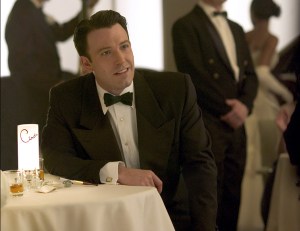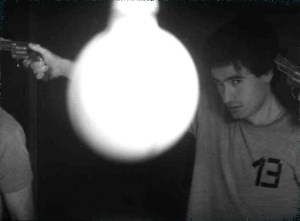Looking at this list, it’s apparent I’ve been slacking. So let’s dispense with Hollywoodland, This Film Is Not Yet Rated, Art School Confidential, Serenity, and 13 Tzameti in fewer than 900 words total.
Yes, it is a motley crew.
Hollywoodland
 Impressively hauling around the millstones of a dreadful title, an unpromising premise, Ben Affleck, and a clumsy structure, Hollywoodland builds to a surprising potency and poignancy in its closing minutes, and has one lovely moment that elegantly ties the movie’s interest in mortality to its superhero iconography.
Impressively hauling around the millstones of a dreadful title, an unpromising premise, Ben Affleck, and a clumsy structure, Hollywoodland builds to a surprising potency and poignancy in its closing minutes, and has one lovely moment that elegantly ties the movie’s interest in mortality to its superhero iconography.
Director Allen Coulter (a veteran of several HBO shows) and writer Paul Bernbaum (a TV vet with a significantly more modest résumé) can’t quite elevate the movie above its pulpy clichés and its inelegantly inserted flashbacks, but they come close. Its shortcomings made me wish somebody had ordered one more draft of the script to really make it sing.
Hollywoodland concerns the death of George Reeves, the man who played Superman on television in the 1950s, but it’s neither a bio-pic nor a mystery; an exploitative private eye (Adrien Brody) is hired by Reeves’ mother to investigate his apparent suicide, and crucial moments from the life of the actor (played by Affleck) are seen in flashback. The movie doesn’t lean too heavily on the story, instead using the narrative as a means to explore ideas.
Coulter and Bernbaum have a light touch when it comes to themes, hitting on issues of decay, double lives, identity, and vulnerability without bludgeoning the audience. Most striking is a scene in which a child points a loaded gun at Reeves, dressed in his Superman costume, in a clever reversal of the classic Clark Kent dilemma: how to defuse the situation without revealing his true identity.
More subtly, the filmmakers contrast youth, virility, and potential with age, weakness, and despondence. As Reeves’ married lover, Diane Lane nearly turns to dust before your eyes, and she and Reeves are both desperate to avoid becoming pathetic.
Brody seems more relaxed than I’ve seen him, and Affleck – while he never disappears into Reeves – taps into a well of uncertainty and hopelessness, and gives the audience a glimpse of his soul.
This Film Is Not Yet Rated
 The passion of Kirby Dick’s muckraking documentary suggests that some grand wrong has been committed.
The passion of Kirby Dick’s muckraking documentary suggests that some grand wrong has been committed.
So what is it?
Dick’s screed against the Motion Picture Association of America’s rating system is well-founded, in the sense that the ratings are permissive about violence and restrictive about sex; that they’re capricious; that they tend to penalize “deviant” sex (in particular, homosexual acts); and that they’re determined in secret.
But what Dick really wants you to believe is that there’s something more heinous than stupidity going on; he wants you to think that the MPAA is censoring filmmakers.
That might have been a fair concern before the widespread adoption of VCRs, or even when Blockbuster – which refuses to carry unrated videos – dominated the movie-rental business. Now, the argument just seems stupid. These days, releasing an “unrated” version of a movie on DVD is a marketing tool.
Aggressively, gleefully crude, the documentary is engaging and fun, but it never justifies its outrage. And button-pushing filmmakers such as John Waters and South Park’s Matt Stone don’t bolster Dick’s case, as they actively exploit the ratings system for publicity and notoriety.
Art School Confidential
 A silly, obvious, and wholly unnecessary skewering of higher education and artistic pretension and interpretation that’s only disappointing if you want each of Terry Zwigoff’s movies to be as cutting as Crumb. I don’t know what compelled Zwigoff’s transition from that observant documentary to the broad comedy of Bad Santa and Art School Confidential, but perhaps the director is mocking his own ambitions here, arguing – by reinforcing the format’s basest tendencies – that commercial cinema cannot succeed as a serious, important artistic medium.
A silly, obvious, and wholly unnecessary skewering of higher education and artistic pretension and interpretation that’s only disappointing if you want each of Terry Zwigoff’s movies to be as cutting as Crumb. I don’t know what compelled Zwigoff’s transition from that observant documentary to the broad comedy of Bad Santa and Art School Confidential, but perhaps the director is mocking his own ambitions here, arguing – by reinforcing the format’s basest tendencies – that commercial cinema cannot succeed as a serious, important artistic medium.
Or maybe he just wanted to make fun of everybody.
Whatever the case, we need more smart people making dumb movies such as this.
Serenity
 Speaking of smart people making dumb movies, Joss Whedon’s Serenity is the only thing he’s done that I’ve genuinely enjoyed. Through Bride of Culture Snob, I’ve been exposed to heavy doses of Buffy the Vampire Slayer and snippets of Firefly – from which this feature sprung – but Whedon has never captured my imagination or my attention. The bad special effects, the inescapable and rote fighting, and his very conventional approach to genres all turned me off his TV series.
Speaking of smart people making dumb movies, Joss Whedon’s Serenity is the only thing he’s done that I’ve genuinely enjoyed. Through Bride of Culture Snob, I’ve been exposed to heavy doses of Buffy the Vampire Slayer and snippets of Firefly – from which this feature sprung – but Whedon has never captured my imagination or my attention. The bad special effects, the inescapable and rote fighting, and his very conventional approach to genres all turned me off his TV series.
But Serenity – a “space western” like Star Wars but with more emphasis on “western” – seems invigorated by the constraints and challenges of the feature format, and characters that bored me quickly in Firefly became much more compelling when I knew our relationship would last no more than two hours. I’m not convinced of the brilliance of Buffy or Firefly, but I’ll happily sit through Whedon’s popcorn flicks.
13 Tzameti
 An austere, black-and-white, French, non-supernatural version of Intacto that would have been much more impressive had it come first instead of four years after. Stripped of most of Intacto’s high-concept-thriller ornamentation, 13 Tzameti operates forcefully as a character study, as a listless young man happens into a gambling ring in which the stakes are very high. I’d recommend going into both movies as blind as possible, so avoid the previously linked Intacto essay if you’re intrigued.
An austere, black-and-white, French, non-supernatural version of Intacto that would have been much more impressive had it come first instead of four years after. Stripped of most of Intacto’s high-concept-thriller ornamentation, 13 Tzameti operates forcefully as a character study, as a listless young man happens into a gambling ring in which the stakes are very high. I’d recommend going into both movies as blind as possible, so avoid the previously linked Intacto essay if you’re intrigued.


I found the oposite to be true for Serenity. I prefered Firefly to the film. As for 13 Tzameti, I think moments of Intacto drifted across my mind once or twice, yet I find it holds up well on its own.
BTW I like the little changes in the site so far.
Squish:
I’m just not a Whedon guy, I think. I’m married to a Buffy junkie, and it does nothing for me. Familiarity hasn’t made me any fonder. Of Buffy, I mean.
As for 13 Tzameti, I don’t disagree that it works, but it shares so many things with Intacto that it feels like a ripoff.
And thanks for the compliment!
The more you know about the sources that Whedon draws from, the less impressive his work gets, because he changes so little of them when he adapts the work.
That said, he gets strong performances from his actors more often than not, and is pretty adept at catering his material TO those actors.
Much of his shows are forgettable, though occasionally the premises, which are designed to be subversive even when they don’t manage it, allow for a stronger display (the way that rote episodes of the X-Files allowed writers like Darin Morgan to explore further). I remember an episode of “Angel” that deliberately took off of “The Shining,” but did so to bring latent themes of misogyny in the work to the fore, and turned the cliched unrequited romances on their ear to show the darknesses inherent to those ideas. I remember being impressed at the audacity – that said, I saw that episode years ago, and I may very well have a different view of it today.